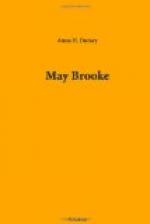“Come in here, and close the door,” said Mr. Stillinghast, while his stern, forbidding countenance wore a strange look of anxiety; “do you remember the young lady; and can you direct me to the place where you sawed the wood?”
“Oh, yes, your honor. I shall never forget her to my dying day. She was a little, bright-eyed lady, with a smile of an angel on her, by dad!”
“May,” muttered the old man, “there is only one May. But I have a reason,” he said, turning to the man, “for wishing to see this old woman; can you conduct me to the place?”
“I’m at your service intirely, sir. It’s a good stretch, though,” said the man, who looked weak from his recent illness.
“Is it near an omnibus route?”
“Yes, your honor, it is close by where they stop. You’ll not have to walk far.”
“Leave your saw here, then, and let us go. I have no time to spare on walks,” said Mr. Stillinghast, in his peremptory way. His real object, however, was not so much to save time, as to afford the man an opportunity to avoid a long and fatiguing walk. “Tell Mr. Jerrold I will be back in the course of an hour,” he said to Michael, as he passed out.
“Very well,” replied Michael, heaving, with Titan strength, a bale on the truck; “and there goes a pair of ’em. My boss can afford to walk with a poor wood-sawyer; he looks like one hisself, and it’s hard to tell ’tother from which;” and he planted his brawny hands on his thighs, and looked after them, with a broad smile on his honest countenance, until they got into the omnibus, and were whirled out of sight. At the depot, which is in the northern part of the city, they got out, and the two men pursued their way in silence. It was one of those cold, but calm, bright days in winter, when the very air seems filled with silent ripples of gladness; when the sunshine rests like a glory on the leafless trees, and bright-eyed robins chirp and peck the moss, as they hop from bough to bough; when the light of heaven is so over all, that even the dun-colored earth, the decayed leaves and rotten branches, which the autumn blast has laid low, look beautiful, and seem to whisper resurgam; when a cold, bracing wind sends the warm blood bounding through our hearts—tinting our cheeks, and warming our extremities, until we bless it, as we do the strong hand which leads us in childhood; and we listen, with docile tenderness, to its teachings, for it tells with pathos, of suffering in the hovels of the poor, and want, and poverty, and bids us thither like a winged angel. Down, beneath the rustic bridge, boys were shouting and skating on the frozen stream, their laughter echoing like music through the old woods; anon, the sharp crack of rifle, or the distant barking of dogs, rung on the still air, while the bells of the city, and the hum rising up from its crowded streets, blending with the clear echoes, made a concert of merry and harmonious




